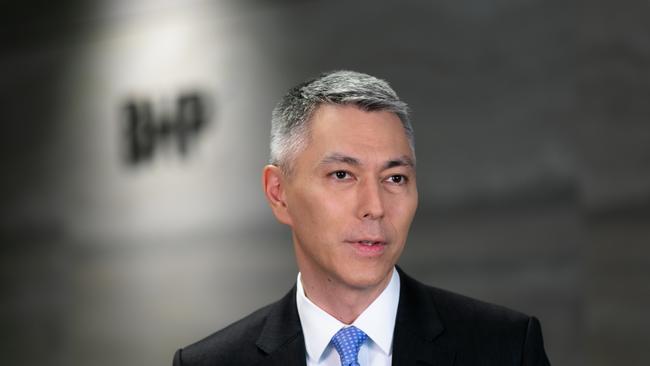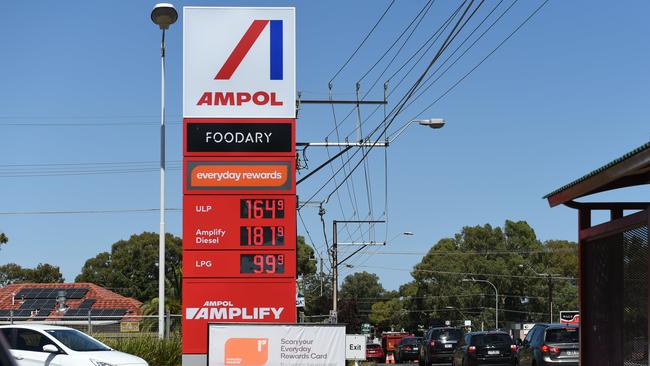BHP warns of economic growth slowdown as inflation bites
The world’s largest miner, BHP, has warned of a global economic growth slowdown as inflation hits amid a commodity price squeeze.

BHP expects a slowdown in global economic growth amid accelerating inflation and surging commodity prices with the fallout from Russia’s invasion of Ukraine further dampening the outlook.
The world’s largest miner in February originally forecast a 5 per cent expansion for world economic growth but on Tuesday trimmed that forecast by 0.5 per cent, partly due to massive jumps in raw material prices which have rattled global markets.
“You’ve seen many hundreds of percentage increases in prices for a range of commodities, but that is going to have spillover economic effects on inflation and potentially on global growth,” BHP chief executive Mike Henry told a conference in Sydney.
“We’re forecasting possibly about a 0.5 per cent lower global growth over the course of the next year than they were previously anticipating. And that’s a combination of the impacts of Russia and Ukraine, but also China coming up with a slightly more positive or aggressive growth target than some were anticipating.”
Oil hit a 14-year high this week above $US139 a barrel while Russia warned a Western ban on importing its crude supplies could more than double prices to $US300 a barrel. Nickel soared by the most on record while coal and LNG have both skyrocketed as buyers scramble to secure alternative supplies with output from Moscow potentially derailed.
Volatility has spiked in the wake of the Ukraine conflict while a broader lift in industry costs was also a juggle for miners, including BHP.
“Markets overall were more volatile heading into the Russia Ukraine conflict certainly on the supply side of things. We’re seeing exacerbated, supply side shocks from conflict, along with weather challenges here in Australia, particularly on the east coast and Covid of course, which continues to disrupt supply chains and supply of some commodities,” Mr Henry said.
“All of these are leading to greater volatility and the key is how companies position themselves to be able to contain inflation. That’s been a big area of focus for us in ensuring costs don’t run away from us.”
Energy companies spanning the globe have been wrestling with how to cut their reliance on Russia, a major commodity producer across oil, gas and coal, amid a backdrop of spiralling oil prices which are piling pressure on economies around the globe.
A raft of Australian companies are grappling with how to quit trade connections to Russia.
The nation’s two oil refiners said on Tuesday they had decided to accept supplies of Russian crude to head off potential fuel shortages, but have banned making new orders due to Moscow’s invasion of Ukraine.
Viva Energy and Ampol, which provide petrol to over 3000 service stations across the country, are both waiting on shipments of Russian oil to arrive in April while stressing the orders were made before the war began.
While both companies have vowed to stop buying crude from Russia, the world’s third largest producer, Viva said it was too late to try and sell the oil supplies on order to another buyer.
“Viva Energy has explored options to dispose of these cargoes, but there are no credible purchasers in the current market and without these supplies the company faces gaps in its refining program and potential fuel shortages,” Viva said in a statement.
“These cargoes have been purchased from international oil companies, rather than from Russian entities.”
While Viva runs the Geelong refinery in Victoria and operates under the Shell Coles Express brand in Australia, its oil is bought through trader Vitol which still owns a major stake in the company.

Ampol, owner of the Lytton refinery in Brisbane, also said it would take two cargoes of oil.
“Ampol has not purchased Russian crude oil or products since the conflict commenced. However, we have two Russian cargoes in our current planned supply chains. These cargoes were purchased prior to the invasion and will discharge prior to the end of April,” the company said in a statement.
Europe is trying to slash its reliance on Russian gas while the US is looking for support from leaders on the continent to also ban Russian oil imports. Australia imports over 80 per cent of its crude, which is then processed into a variety of fuel types including petrol, diesel and jet fuel.
Both companies said Russia only provides a small quantity of crude to Australia, understood to be less than 2 per cent, with Viva stating it could source volumes from other countries even as global supplies tighten.
“Viva Energy sources crude from many different countries, and expects to be able to maintain supplies of crude oil and fuel to support Australia’s energy security during these difficult and uncertain times. We are keeping the Australian Government informed of the evolving situation,” the company said.
Ampol said the Australian transport energy market “is not reliant on Russian oil” with its Lytton refinery sourcing oil from south-east Asia, Africa, North America and the Middle East.
Still, with Brent crude oil in Australian dollar terms surging by $40 a barrel to a record $173 a barrel – an increase of 30 per cent, analysts have warned motorists should be prepared to pay at least $2.15 a litre in the near future.
Ampol indicated petrol prices would invariably rise.
“Geopolitical events in the Ukraine and current international sanctions are putting pressure on global oil prices and this is in turn impacting Australian retail fuel prices. We will continue to focus on delivering products safely and reliably to our customers using the strong existing supply chains we have in place,” Ampol said in a statement.
A string of refineries including BP’s Kwinana and ExxonMobil’s Altona plant have shut in the last few years, with the bulk of supplies imported from bigger facilities in Singapore, South Korea and Japan.



To join the conversation, please log in. Don't have an account? Register
Join the conversation, you are commenting as Logout